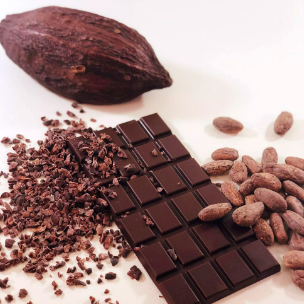More to Love about Chocolate!
Katie Noble, BNat Med
SPCNM Graduate Practitioner 2019
Easter means lots of different things to different people. Time with family, time for reflection and prayer, and without doubt chocolate…
What a good excuse to reflect on the glory of chocolate.
HISTORY OF CHOCOLATE
Anthropologists have found evidence of its use as far back as 1900 BC. Chocolate was made into an invigorating drink by the Olmec, Mayan and Aztec civilisations for its mood enhancing and aphrodisiac properties. They also believed it to possess mystical and spiritual qualities.
In the 1500’s chocolate had spread to Spain and was considered a symbol of luxury, wealth and power and only the elite could enjoy the silky drink. In the 1600’s chocolate became popular in the French Royal courts, and then in 1828 a Dutch chemist invented the cocoa press which separated the fatty cocoa butter and left behind a dry cake which was ground into a powder. This was then moulded into chocolates and the chocolate that we know now was born.
In the late 1990’s rates of heart disease were high in Panama, but a small island off the coast had very low rates. Further investigation revealed the inhabitants of the island were drinking multiple cups of a beverage made from the cacao plant, and samples revealed that cacao was very high in flavonoids and antioxidants that protect against heart disease. And so the studies began.
HEALTH BENEFITS
One of the highlights of studying at SPCNM was the annual visit to South Pacific from our renowned adjunct visiting professor Dr Simon Mills. Apart from the incredible knowledge and insights that he freely shared, his opinion that we should all consume 50gm of quality dark chocolate daily was music to my ears.
So, what is so great about it?
- Dark chocolate cocoa solids have more antioxidant flavonoids than almost any other food – in fact 5 x times that of the same weight of blueberries.
- Increases insulin sensitivity and good HDL cholesterol while decreasing blood pressure and bad LDL cholesterol. Plus, it reduces unwanted blood-cell clumping and inflammation.
- 45gm of dark chocolate per day was shown to increase blood flow through coronary arteries due to preventing harmful LDL cholesterol from becoming oxidised and taken up into artery walls.
- Cacao can improve your cognitive function possibly from improved blood flow to the brain.
- A study showed eating 100gm dark chocolate per day can reduce blood pressure by 5.1/1.8 mmHg which is enough to reduce risk of heart attack or stroke by 21%.
- Chocolate gets a bad rap when it comes to acne, but 72% dark chocolate contains anti-inflammatory antioxidants which may help improve symptoms.
- The theobromine in chocolate can suppress cough and reduce airway spasm in asthma.
- High-polyphenol chocolate improved symptoms of people with chronic fatigue including a reported decrease in anxiety symptoms.
The key here is the theme that it is the dark chocolate (72% cocoa solids) which is bringing the health benefits – so before you reach for that king size block of creamy milk… think again!
If you find the darker chocolate hard going to start with, start increasing the cocoa solids until you can enjoy a darker block. But also take care if you are sensitive to coffee, you may find the cocoa too stimulating.
References
Brewer, S. (2013). Eat well, stay well: What to eat to beat common ailments. Connections Book Publishing: Londong, Great Britain.
De La Foret, R. (2017). Alchemy of herbs: Transform everyday ingredients into foods and remedies that heal. Carlsbad, CA: Hay House.
Klein, C. (2014). The sweet history of chocolate. Retrieved from https://www.history.com/news/the-sweet-history-of-chocolate
Weird chocolate fact:
Countries with the highest chocolate consumption per capita produce the most Nobel prize winners.




